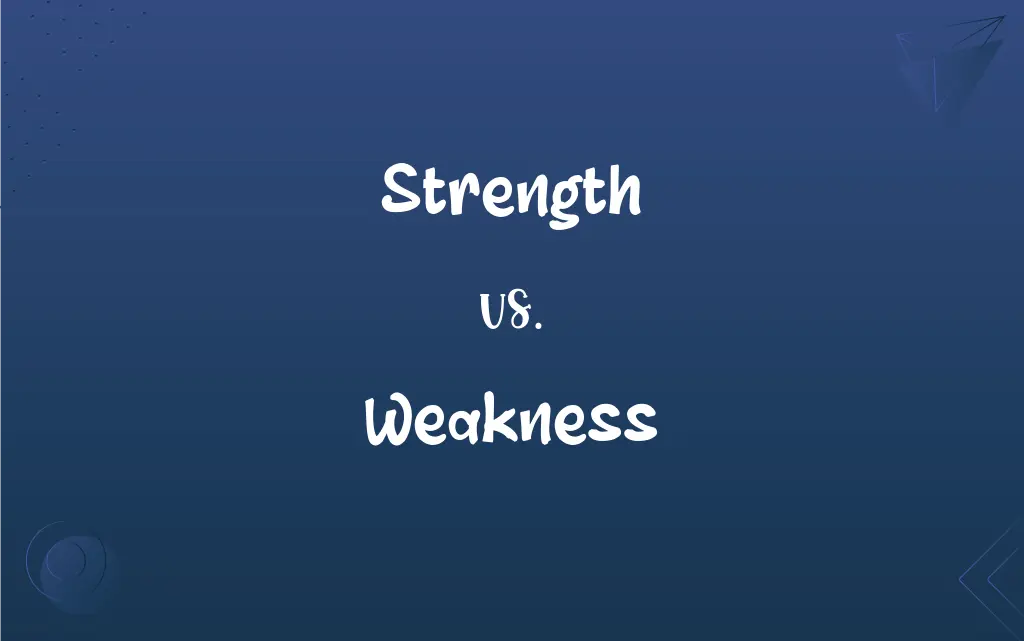Strength vs. Weakness: What's the Difference?
Edited by Aimie Carlson || By Janet White || Published on January 21, 2024
Strength refers to the capacity for exertion or endurance, while weakness denotes a lack of strength or a specific vulnerability.

Key Differences
Strength embodies the ability to withstand stress or adversity, showing resilience and robustness, whether physically, mentally, or emotionally. Conversely, weakness represents the absence or deficiency of such ability, often leading to a greater susceptibility to challenges or failures.
In a social context, strength might manifest as confidence and assertiveness, helping individuals navigate complex social dynamics effectively. On the other hand, weakness in this realm could appear as timidity or hesitation, potentially hindering effective social interactions.
In the intellectual realm, strength is depicted through clarity of thought, analytical ability, and decisiveness. Weakness, in contrast, is often characterized by confusion, indecisiveness, and a lack of conviction or understanding.
Emotionally, strength is reflected in one's ability to cope with stress and recover from setbacks, demonstrating resilience and fortitude. Weakness in emotional aspects is seen as susceptibility to emotional upheaval, difficulty in coping with stress, and prolonged recovery from emotional wounds.
In physical terms, strength is quantified by muscle power, endurance, and physical capability. Weakness, physically, is noted by a lack of these qualities, often leading to reduced physical performance and endurance.
ADVERTISEMENT
Comparison Chart
Physical Ability
High endurance and power
Low endurance and power
Emotional Capacity
Resilience to stress
Susceptibility to stress
Mental Acuity
Clarity and decisiveness
Confusion and indecisiveness
Social Interaction
Confidence and assertiveness
Timidity and hesitation
Intellectual Skills
Analytical and understanding
Lack of clarity and conviction
ADVERTISEMENT
Strength and Weakness Definitions
Strength
Mental Fortitude.
Her strength in solving complex puzzles quickly is remarkable.
Weakness
Emotional Vulnerability.
She showed weakness by being easily upset by minor issues.
Strength
Social Influence.
She exerted her strength in leadership during the group discussion.
Weakness
Mental Barrier.
Complex problems revealed a weakness in her otherwise sharp intellect.
Strength
Physical Power.
He demonstrated his strength by lifting the heavy box effortlessly.
Weakness
Social Insecurity.
In debates, his weakness is his lack of assertiveness.
Strength
Intellectual Capacity.
His strength in understanding advanced concepts is exceptional.
Weakness
Physical Limitation.
His weakness was evident when he struggled to carry the groceries.
Strength
Emotional Resilience.
After the setback, his strength to bounce back was inspiring.
Weakness
Intellectual Shortcoming.
Understanding abstract theories is a weakness for him.
Strength
The state or quality of being strong; physical power or capacity
The strength needed to lift a box.
Weakness
The condition or quality of being weak.
Weakness
A personal defect or failing.
FAQs
What defines physical strength?
Physical strength is the body's ability to exert force and perform physically demanding tasks.
Is weakness always negative?
Not necessarily; recognizing weakness can be a step towards improvement and self-awareness.
Can weaknesses be turned into strengths?
Yes, with effort and dedication, weaknesses can often be transformed into strengths.
How can one identify their strengths?
Through self-reflection, feedback, and exploring different experiences and challenges.
How do strengths benefit an individual?
Strengths enable individuals to excel in various aspects of life and overcome challenges.
Can strengths become weaknesses?
In certain contexts, overreliance on a strength can become a weakness.
How important is it to balance strengths and weaknesses?
Balancing them is crucial for personal development and achieving success in various life aspects.
How is mental strength different from physical strength?
Mental strength refers to the ability to handle psychological challenges, unlike physical strength which is bodily capacity.
Can emotional strength be developed?
Yes, emotional strength can be developed through experiences, self-awareness, and coping strategies.
Can a person's strengths affect their relationships?
Yes, strengths like communication and empathy can greatly enhance relationships.
How can weaknesses impact professional life?
Weaknesses can limit professional growth if not acknowledged and addressed.
Are strengths and weaknesses static?
No, they can change over time with experiences, learning, and personal growth.
Does everyone have both strengths and weaknesses?
Yes, everyone possesses a mix of strengths and weaknesses, which define their unique capabilities.
What role does environment play in shaping strengths and weaknesses?
The environment can significantly influence the development and manifestation of both strengths and weaknesses.
Is it normal to feel insecure about weaknesses?
Yes, it's common, but acknowledging and working on them can build confidence.
Do strengths always lead to success?
Not always; success often requires a combination of strengths, effort, and favorable circumstances.
Is it possible to have no weaknesses?
It's unlikely, as everyone has areas where they are less skilled or confident.
Can external help improve strengths and weaknesses?
Yes, guidance from mentors, coaches, and therapists can be instrumental.
Are certain strengths more valuable than others?
The value of strengths can vary depending on context and personal goals.
Is it better to focus on strengths or weaknesses?
A balanced focus on both is generally most beneficial for holistic development.
About Author
Written by
Janet WhiteJanet White has been an esteemed writer and blogger for Difference Wiki. Holding a Master's degree in Science and Medical Journalism from the prestigious Boston University, she has consistently demonstrated her expertise and passion for her field. When she's not immersed in her work, Janet relishes her time exercising, delving into a good book, and cherishing moments with friends and family.
Edited by
Aimie CarlsonAimie Carlson, holding a master's degree in English literature, is a fervent English language enthusiast. She lends her writing talents to Difference Wiki, a prominent website that specializes in comparisons, offering readers insightful analyses that both captivate and inform.







































































